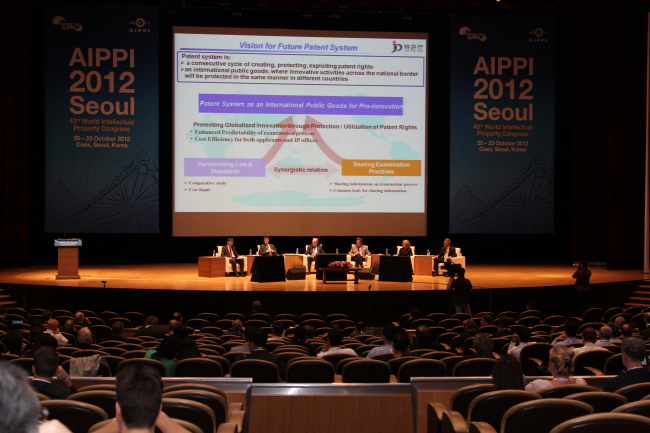Members of the 2012 APPI Intellectual Property Congress in Seoul started ramped up their learning curve on Sunday by sailing through a number of IP-related plenary sessions and workshops, following a warm-up period for the first two days.
Attendees expressed their keen interest in the Korean legal system, in what is one of the fastest-moving IP protection markets in the world as a high-tech export-driven nation.
In the afternoon, a plenary session opened up the topic of the future of the patent system. Panels from the world’s leading national patent offices and WIPO discussed improvements in legal environments in such major IP markets as the U.S. and Europe, aimed at seeking harmonization in the international patent system. Attendees had a chance to learn how to cope with the global patent system in transition.
 |
Key AIPPI members discuss perspectives on the future of the patent system at COEX in Seoul on Sunday. (AIPPI) |
The participants enjoyed exploring Korean culture in an event at Bongeunsa Buddhist temple.
Another highlight on Sunday was a patent mock trial designed to offer participating IP professionals an opportunity to raise their understanding of procedures for decision making in the Korean patent court and to catch up with hot topics in global patent protection.
The mock trial dealt with a legal dispute between a non-practicing entry, or NPE, in Korea and a chemical company in U.K. NPEs are organizations that seek revenue by licensing their patents without manufacturing products based on them.
To run the mock trial under the Korean legal system, Kim Young-ki, a judge from the Seoul District Court, was invited as a chief judge, while internationally renowned judges, including Randall Rader, chief judge in the U.S. Court of Appeals for the Federal Circuit, took part in the trial as international commentators to exchange their views on the case based on their experiences gained in a number of IP-related legal battles.
Among the series of workshops and sessions on Monday, four workshops were held on pharmaceutical IP. Pharmaceutical patents are frequently challenged resulting in costly litigation between the innovator companies and generic companies, particularly in the U.S. and Europe.
Under the topic of settlement of pharmaceutical disputes and competition law, speakers discussed the proper role of settlements in pharmaceutical litigation from a global perspective, keeping in mind the integral connection between patent law and drug regulatory law in their respective jurisdictions. Another pharma workshop dealing with stem cell patents also attracted much attention.
Speakers presented new challenges to technology and communication during a workshop on cloud computing and its impact on IP in the afternoon.
The event looked at IP-related clauses in cloud services contacts and considered patent issues in this area, such as inventorship “in the cloud,” as well as copyright questions raised by the creation, copy, storage, use, compilation and processing of content, such as authorship and ownership.
It also provided IP owners and practitioners with a general outline into the future of the relevance of cloud platforms.
By Seo Jee-yeon (
jyseo@heraldcorp.com)




![[Herald Interview] 'Trump will use tariffs as first line of defense for American manufacturing'](http://res.heraldm.com/phpwas/restmb_idxmake.php?idx=644&simg=/content/image/2024/11/26/20241126050017_0.jpg)


![[Health and care] Getting cancer young: Why cancer isn’t just an older person’s battle](http://res.heraldm.com/phpwas/restmb_idxmake.php?idx=644&simg=/content/image/2024/11/26/20241126050043_0.jpg)
